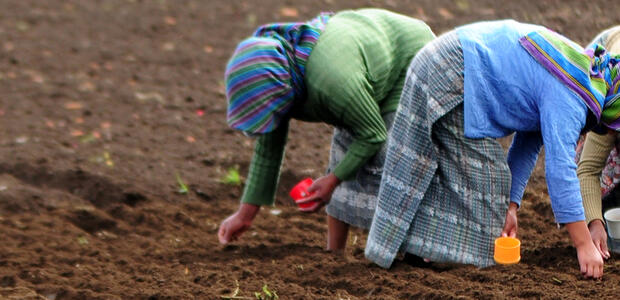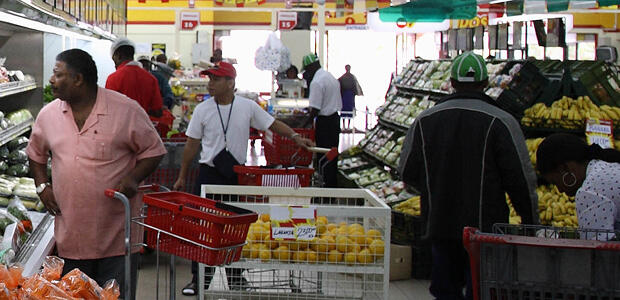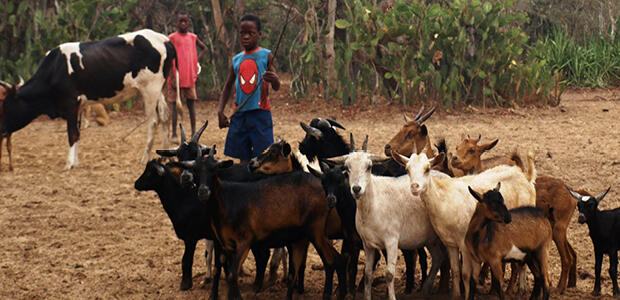Working Paper
Is inequality underestimated in Mozambique?
Household budget surveys in sub-Saharan Africa are designed to facilitate poverty measurement and may fail to fully capture consumption in wealthy households. As a result, inequality is likely underestimated. We address upper tier consumption...
Working Paper
Contracts between smallholders and private firms in Mozambique and their implications on food security
The focus of this paper is the role played in rural contexts by contract farming agreements between smallholders and private investors. These contracts can take different forms, but in general are agreements under which producers commit to supply...
Blog
What would it take for Mozambique’s growth to be inclusive?
In late November 2017 more than 100 people gathered in Maputo, Mozambique, to participate in a joint reflection on poverty and inequality in the...
Working Paper
Contract farming in Mozambique
This paper analyses the implication of contract farming on gender inequalities in rural Mozambique. Contract farming is often considered one of the major tools of agribusiness development: it broadly includes those arrangements under which producers...
Working Paper
Exiting the fragility trap
Those fragile states whose stagnation is so tenacious despite generous aid programs, and substantial and costly interventions, are stuck in a ‘fragility trap.’ Caught in a low-level equilibrium, trapped states appear to be in a perpetual political...
Working Paper
Robustness tests for multidimensional poverty comparisons
This paper provides practical tests for the robustness of multidimensional comparisons of well-being. Focussing on counting-type multidimensional poverty measures, I draw on the properties of positive Boolean threshold functions to prove that the...
Working Paper
Gender inequality in employment in Mozambique
We investigate the trend in the gender employment gap in the expanding non-subsistence sector of the economy in Mozambique, a country still characterized by a large subsistence agricultural sector. We show evidence that the gender gap has widened...
Working Paper
Investigating growing inequality in Mozambique
In this paper, we investigate the long-term trend of consumption inequality in Mozambique. We show that an imbalanced growth path disproportionally benefited the better-off and caused increasing inequality, especially in more recent years, curbing...
Working Paper
The counting approach to multidimensional poverty
This paper investigates the levels and evolution of poverty in Malawi, Mozambique, Tanzania, and Zimbabwe using the decomposability properties of poverty measures based on a counting approach. We compare poverty measures such as the Alkire and Foster...
Working Paper
Does women’s empowerment affect the health of children?
In developing countries, women’s decisions concerning their children’s health depend on ‘empowerment’ concerning decision-making, husband/partner’s use of violence, woman’s attitude towards this violence, available information, and resources. We...
Working Paper
Educational inequality in Mozambique
In very poor countries, inequality often means that a small part of the population maintains living standards far above the rest. This is also true for educational inequality in Mozambique: only a small segment of the population has access to higher...
Workshop
 Quantitative methods for applied economic analysis
Quantitative methods for applied economic analysis
Tue, 27 September 2016
–
Fri, 30 September 2016
Eduardo Mondlane University,
Maputo,
Mozambique
Past event
Seminar
Multidimensional Child Poverty Assessment Methodology
The ‘Multidimensional Child Poverty Assessment Methodology’ seminar was held in Maputo on 8 July 2015. It was part of the UNU-WIDER Research Programme theme of Transformation organized in partnership with the Ministry of Economics and Finance of...
Wed, 8 July 2015
University Eduardo Mondlane,
Avenida do Zimbábwe,
Maputo,
Mozambique
Past event
Workshop
Analysing poverty
The Analysing Poverty workshop was held in Maputo, 6-10 July 2015. The workshop is part of the UNU-WIDER Research Programme theme of Transfromation, in co-operation with Ministry of Economics and Finance of Mozambique, the University Eduardo Mondlane...
Mon, 6 July 2015
–
Fri, 10 July 2015
University Eduardo Mondlane,
Avenida do Zimbábwe,
Maputo,
Mozambique
Past event
In the media
Blog post on poverty in Mozambique grabs the attention of Mail & Guardian Africa
The release of the Mozambique’s Fourth Poverty Assessment in late October in Maputo has brought good news to Mozambique. Despite recent economic and political challenges, the findings of the report show significant gains in the fight to reduce...
Presentation
 Presentation at the AERC Policy Seminar
Presentation at the AERC Policy Seminar
Thu, 26 March 2015
–
Fri, 27 March 2015
Maputo,
Mozambique
Past event
Journal Article
Learning by Exporting
Part of Journal Special Issue
Learning to Compete
Working Paper
Gender divide in agricultural productivity in Mozambique
In this study we analyze the gender gap in agricultural productivity in Mozambique applying the Oaxaca-Blinder decomposition approach on data from four agricultural surveys between 2002 and 2012. We find that female-headed households are on average...
Working Paper
Economic impacts of developing a biofuel industry in Mozambique
Mozambique is one of the most promising African countries for producing biofuels and the national biofuel policy of 2009 identifies measures to incentivize biofuel production. Demand for biofuels in the Southern African Development Community is...
Working Paper
A review of social issues for biofuels investment in Mozambique
This study discusses the potential for expanding cultivation of biofuel feedstock in Mozambique from several angles. Taking the case of sugarcane, it explores the potential to expand production, through exploring both biophysical factors and patterns...
Working Paper
Mapping deprivation in Mozambique
In this study we analyse the evolution of deprivation indicators and of a multidimensional poverty index using Mozambican census data for 1997 and 2007. We analyse deprivation levels according to eight different indicators reflecting housing...
Presentation
Apresentação dos resultados
Finn Tarp presented: INQUÉRITO AS INDÚSTRIAS MANUFACTUREIRAS 2012 (IIM 2012): APRESENTAÇÃO DOS RESULTADOS Mozambique’s Ministry for Planning and Development and in partnership with the Confederation of Economic Associations, Copenhagen University and...
Thu, 23 January 2014
Maputo,
Mozambique
Past event
Seminar
Vincenzo Salvucci presents at the Inclusive Growth in Mozambique 2019 seminar series
Vincenzo Salvucci, a researcher from the University of Copenhagen, will present a seminar on 13 March 2019 at the Eduardo Mondlane University in Maputo. The seminar is titled Vulnerabilidade às Calamidades Naturais: Avaliação do Impacto a Curto Prazo...
Wed, 13 March 2019
Faculty of Economics, Postgraduate Room, the Eduardo Mondlane University, Main Campus,
Av. Julius Nyerere nr. 3453,
Maputo,
Mozambique
Past event
News
Inclusive growth in Mozambique seminar series
The Inclusive growth in Mozambique programme is launching its seminar series for 2019. The seminar series showcases ongoing research on topics related to the work of the programme and its aim of supporting inclusive growth in Mozambique. The seminar...
Seminar
Public Forum on extractive industry and development
The Inclusive growth in Mozambique programme will host a public forum on 26 March 2019 on the topic of Extractive Industry and Development. The Chief Economist and Deputy Director of UNU-WIDER Tony Addison will give a presentation based on a major...
Tue, 26 March 2019
Complexo Pedagógico, Room 1501, Main Campus, Eduardo Mondlane University,
Maputo,
Mozambique
Past event
Policy seminar
 Tony Addison presents at a high-level policy dialogue in Maputo
Tony Addison presents at a high-level policy dialogue in Maputo
Wed, 27 March 2019
–
Thu, 28 March 2019
The Bank of Mozambique ,
Maputo,
Mozambique
Past event
In the media
National media coverage on public forum on extractives
The Inclusive Growth in Mozambique programme organized a public forum on Extractive Industry and Development on 26 March 2019, in Maputo. The public forum explored the growing role and importance of oil and gas and mining in developing countries, as...
Seminar
David Evans presents at the Inclusive Growth in Mozambique seminar series
David Evans will give a presentation on 25 April at the Eduardo Mondlane University, Maputo, on ‘Addressing the global learning crisis: can improved teacher practices help?’. The presentation will be in Portuguese. The event is part of the seminar...
Thu, 25 April 2019
Eduardo Mondlane University, Faculty of Economics, Second Floor, Room 317,
Av. Julius Nyerere nr. 3453,
Maputo,
Mozambique
Past event
In the media
Researchers from the Inclusive Growth in Mozambique programme interviewed in Dimensions magazine
UNU-WIDER research fellow Vincenzo Salvucci, and Finório Castigo, a specialist from the Ministry of Economy and Finance of Mozambique, were interviewed by Dimensions magazine on multidimensional poverty measurement. The article was published in...
News
Researchers from the Inclusive Growth in Mozambique programme contribute to the book Challenges of Mozambique 2018
The Institute for Social and Economic Studies (IESE) launched the ninth edition of the book Desafios para Moçambique 2018 (Challenges of Mozambique 2018) on 8 November 2018 in Maputo, Mozambique. The book has 18 chapters divided into four parts...
News
Ricardo Santos reviews what is known on the Mozambican labour force
The Mozambican work force is still mostly rural, mostly working in agriculture and outside of the formal labour market. According to official statistics, the rural and urban labour markets differ a lot in Mozambique. In rural areas 90% of the labour...
Policy seminar
Enterprise development: How are Mozambican manufacturing firms doing? Findings from 2017
On 23 April 2018, the Inclusive Growth in Mozambique project hosted a public forum to share the results of its report on the business landscape for Mozambican manufacturing firms. The event sheds light on the current challenges faced by micro-, small...
Mon, 23 April 2018
Polana Serena Hotel,
Julius Nyerere Avenue, 1380,
Maputo,
Mozambique
Past event
Seminar
CEEG Seminar Series: Economic growth of Mozambique and its interaction with the environment
On Wednesday 24 August 2022, Mônica Magaua, PhD candidate at the Faculty of Economics of the University of Eduardo Mondlane (UEM), will present her recent study on the economic growth in Mozambique and its interaction with the environment. The...
Wed, 24 August 2022
Faculty of Economics, Auditorium University of Eduardo Mondlane (UEM),
Av. Julius Nyerere nr. 3453, Main Campus,
Maputo,
Mozambique
Past event
Seminar
CEEG Seminar Series: The role of mobile money in reducing economic inequality in Mozambique
On Wednesday 10 August 2022, Moisés Siúta, PhD candidate at the University of Cape Town, will present his recent study on the role of mobile money in reducing economic inequality in Mozambique. The seminar is part of the CEEG Seminar Series...
Wed, 10 August 2022
Faculty of Economics, Auditorium University of Eduardo Mondlane (UEM),
Av. Julius Nyerere nr. 3453, Main Campus,
Maputo,
Mozambique
Past event
Presentation
SOUTHMOD work presented at the Mozambique Social Protection Week
The Ministry of Gender, Child and Social Action (MGCAS) organises a Social Protection theme week in Mozambique 11-15 October 2021. During the week, on 15 October, The Mozambican Ministry of Economy and Finance (MEF) with Internation Labour...
Fri, 15 October 2021
Radisson Blu,
Mozambique
Past event
Presentation
MOZMOD work presented at the Mozambique Social Protection Week
The Ministry of Gender, Child and Social Action (MGCAS) organises a Social Protection theme week in Mozambique 21-27 November 2022. During the week, on 25 November, The Mozambican Ministry of Economy and Finance (MEF) with Internation Labour...
Fri, 25 November 2022
Centro de Conferencias Joaquim Chissano,
Maputo,
Mozambique
Past event
Seminar
Economic development and institutions – perceptions and bottlenecks
On 15 March 2022, the Faculty of Economics of the University of Eduardo Mondlane (UEM) organizes an event launching a cycle of debates on institutional performance and economic development in Mozambique. The event, entitled ‘Economic Development and...
Tue, 15 March 2022
Online,
Av. Julius Nyerere nr. 3453, Main Campus,
Maputo,
Mozambique
Past event
Seminar
CEEG Seminar Series: The economic recession in Mozambique
On Wednesday 23 February 2022, Michael Sambo, Researcher at IESE, will present a recent study entitled The economic recession in Mozambique: Was it COVID-19? – A look from the external sector. The seminar is part of the CEEG Seminar Series, organized...
Wed, 23 February 2022
Faculty of Economics, Auditorium University of Eduardo Mondlane (UEM),
Av. Julius Nyerere nr. 3453, Main Campus,
Maputo,
Mozambique
Past event
News
Tony Addison speaks on extractives industries and development during Mozambican MPs’ visit to Finnish parliament
UNU-WIDER Chief Economist-Deputy Director, Tony Addison, presented on the extractives industries and development during the exchange visit of the 5th Commission of the Parliament of Mozambique to Finland on 14 November 2017. Addison spoke to the...
Seminar
The effects of firm formalization — a mixed-method study on Mozambique
On 17 September 2020, Hanna Berkel, researcher at the University of Copenhagen, will discuss her latest research on the impact of formalization on Mozambican firms.
Thu, 17 September 2020
Zoom,
Maputo,
Mozambique
Past event
Seminar
Elections and the African electoral system — challenges and perspectives for Mozambique
On 15 October 2020, Professor A. Hama Thay, researcher at the University of Eduardo Mondlane, will discuss his latest research on elections and African electoral system.
Thu, 15 October 2020
Zoom,
Maputo,
Mozambique
Past event
Seminar
Decentralization reforms in Mozambique – the role of institutions in the definition of results
On 11 November 2020, Salvador Forquilha, Director and Senior researcher at IESE, will discuss his research.
Wed, 11 November 2020
Hotel Montebelo Girassol,
Av. Patrice Lumumba,
Maputo,
Mozambique
Past event
Seminar
The education sector in Mozambique – from access to epistemic quality in primary education
On 18 November 2020, Mouzinho Mário, Professor at the University of Eduardo Mondlane, will discuss his research on access and epistemic quality of primary education in Mozambique.
Wed, 18 November 2020
Hotel Montebelo Girassol,
Av. Patrice Lumumba,
Maputo,
Mozambique
Past event

 Join the network
Join the network










